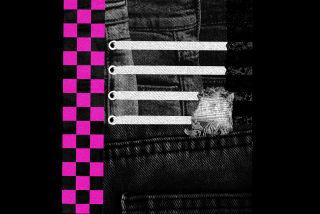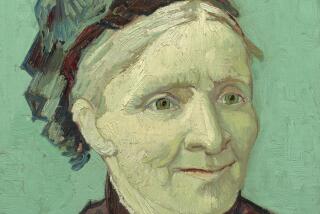Inevitable Discomfort From Free Expression
- Share via
Bill Bradley was asked on television the other night what should be done about good ol’ boy John Rocker for sharing his dark biases in a Sports Illustrated article whose quotes have traveled the airwaves faster than the Atlanta Braves relief pitcher’s 95-mph heater.
It was, broadly speaking, a cultural question relating to bigotry passed from one generation to another in an environment where enlightenment remains confined to the back of the bus.
Presidential hopeful Bradley’s thumbs down on Rocker was predictable. But that didn’t rescue him from a beaning in Monday’s Iowa caucuses, where he finished far behind Vice President Al Gore in pursuit of the Democratic nomination, as Texas Gov. George W. Bush beat back Steve Forbes on the Republican side.
How curious, though, that a dumb jock’s few coarse remarks about foreigners, gays, ethnic minorities and New York Mets fans would snowball into a wintry litmus test for a would-be president. Especially in a campaign where issues regarding U.S. culture have barely registered beyond wild swings at media violence following the Columbine High School shootings in Littleton, Colo.
That aside, there was only last fall’s footnote of Bush supporting and Gore opposing New York City Mayor Rudolph W. Giuliani’s petulant vow to severely punish the Brooklyn Museum of Art in the pocketbook for exhibiting a controversial painting by Chris Ofili of the Virgin Mary featuring pornographic images and bits of elephant dung. Even if the painting was as banal and repulsive as some of its critics insist, Giuliani’s assault on the 1st Amendment sank still lower. As did Bush’s strong praise of the GOP mayor, and Gore’s refusal to go beyond a vaguely worded rebuke.
You’d like to sound out these presidential contenders on the state of culture in the U.S., sit them around a table for an hour or so for a schmooze in-depth. Charlie Rose is a fellow who could do it on PBS.
Do they agree with Pablo Picasso, for example, that “art gives form to our terrors as well as our desires”? And where do they stand on Mark Twain’s “Adventures of Huckleberry Finn,” which the Enid, Okla., school board is considering removing from a required reading list?
Say what?
Kid floats down Twain’s favorite river on a raft. What’s to dislike? Plenty, for some.
Which brings us to “Culture Shock,” a smart and important documentary series that PBS is airing on two consecutive Wednesdays in chunks whose imposing thickness (2 1/2 hours and 2 hours) may challenge even dedicated viewers.
It opens with zest and strength, using the past to comment on the present in 90 minutes from producer Jill Janows on Twain’s much-beloved--and much-banned--Huck, followed by an hour from Richard P. Rogers baring all about “Olympia,” the once-despised 18th century nude painted by Edouard Manet. Then in next week’s interesting Part 2 comes early movie censorship that was meant to “stop the sewage at its source,” and the “devil music” of the ‘20s jazz age.
Alleged devils are a subtext of this entire series.
“Culture Shock” will come under the laser scrutiny of Okies in Enid. The school board there is reported to be awaiting tonight’s opening segment before deciding the fate of “Huckleberry Finn,” which is widely regarded as a masterpiece, just as its author is often anointed the father of the modern American novel.
“Huckleberry Finn” follows a white outcast boy and runaway slave named Jim as they flee on a raft down the Mississippi River in the 1840s. Published in 1884, long after the Civil War, the sophisticated novel attacks bondage and inhumanity as institutions that linger indefinitely. The raft and river become a sort of refuge from the corrupting social influences on the shore, against which Twain contrasts Huck’s innate goodness and evolving awareness, although the Missouri youth never questions what he’s been taught about slavery.
Almost from its inception, controversy has risen around the novel like mist from the Mississippi. What many regard as its greatest strength--its narrative in regional dialect entirely from Huck’s point of view--continues to evoke charges that it stereotypes blacks and promotes the racism that Twain, the son of slave owners, sought to ridicule.
It’s a Tempe, Ariz., school board that largely occupies the opening segment of “Culture Shock,” which celebrates both the novel and the right of its critics not to celebrate it. They include Kathy Monteiro, a thoughtful mother whose passionate crusade to have “Huckleberry Finn” dropped from the mandatory reading list at her daughter’s Tempe high school is examined here.
“I’m wondering as a teacher and as a mother, how you can ask kids to go home and read the word ‘nigger’ 200-something times . . . and then expect kids to come to school and not use the word,” says Monteiro, who is white, her daughter black.
As counterpoint, “Culture Shock” has African American scholars and others defend the novel and Huck’s repeated use of the racial slur because, as one notes, it was “the operative word in the South.” In fact, the problem here seems not to be so much the novel but the failure of teachers to give it clear context and explain to students that laundering Huck’s language and his view of Jim through 1840s eyes would launder Twain’s antiracist message.
“Learning has never been painless,” argues Jocelyn Chadwick-Joshua, an African American scholar at odds with Monteiro and her teenage daughter on Huck.
Observing Manet’s lovely “Olympia” through 21st century eyes, it’s difficult imagining this benignly reclining nude courtesan with the mysterious gaze causing even the slightest pain. Yet without equating Ofili’s modern Virgin Mary with Manet’s famous nude, last fall’s volcanic eruption in Brooklyn did match in some ways the level of outrage that greeted “Olympia” when it was unveiled in Paris in 1865.
Not that nudity on canvas was scandalous then, for nudes had been painted by masters and others for eons, and Manet based his own painting on Titian’s “Venus of Urbino.” It was the manner in which Manet painted his subject that drew such howls, we hear from art scholars. “It wasn’t the fact that she’s nude and she’s a lower-class nude, but also the fact that she was painted in . . . what many people read as almost childish or unskilled fashion,” explains art historian Anne McCauley.
“They are raining insults on me,” Manet wrote to his friend, French poet Charles Pierre Baudelaire. “Something must be wrong.”
Something was--with the critics, apparently, for Manet is now regarded as a superstar, and his once-reviled “Olympia” is now ensconced in the Louvre as a French national treasure, affirming that artistic expression in all forms needs room and time to breath.
The point here is that today’s trash may be tomorrow’s masterpiece, and “the damned human race,” as Huck describes us, is capable of ignorance and excess at any point in time. Ask John Rocker.
* “Culture Shock’s” “Born to Trouble: Adventures of Huckleberry Finn” can be seen at 9 tonight on KCET-TV, KVCR. “The Shock of the Nude: Manet’s Olympia” follows at 10:30. Two segments of “Culture Shock” will air Feb. 3. The network has rated them TV-PG-L (may be unsuitable for young children with special advisories for language).
*
Howard Rosenberg’s column appears Mondays, Wednesdays and Fridays. He can be contacted via e-mail at [email protected].
More to Read
Get the L.A. Times Politics newsletter
Deeply reported insights into legislation, politics and policy from Sacramento, Washington and beyond. In your inbox three times per week.
You may occasionally receive promotional content from the Los Angeles Times.










